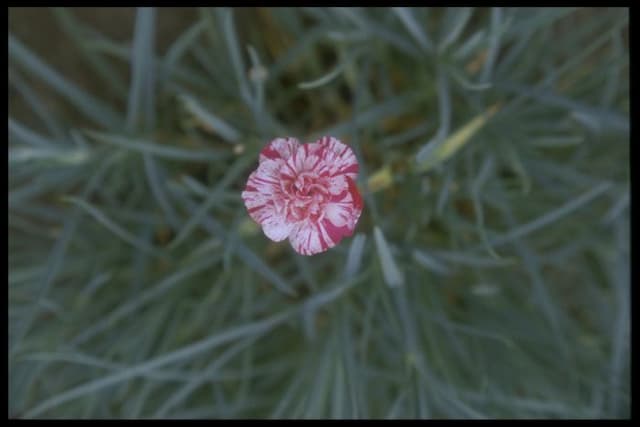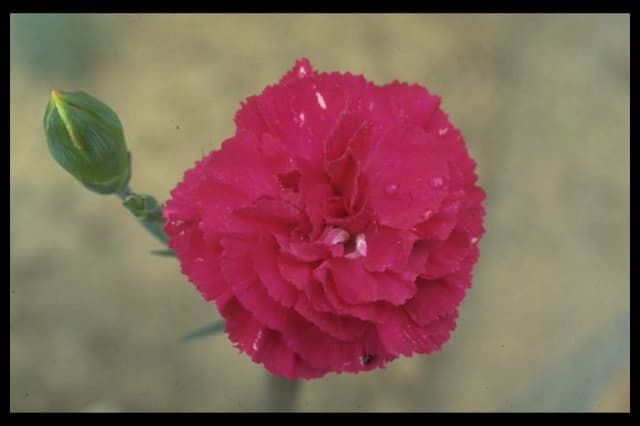Sweet William Dianthus 'Devon Dove' (PBR) (p)

ABOUT
Dianthus 'Devon Dove' is a charming and delightful plant that is particularly noted for its distinctive flowers. Each bloom presents as a soft, creamy white color, often with a delicate blush of light pink that graces the petals. The flowers themselves are usually double, meaning they have multiple layers of petals, which adds a fullness and depth to their appearance. The edges of these petals can have a slight frilly or ruffled texture, giving a sense of daintiness to the already elegant flower. The foliage of 'Devon Dove' is slender and elongated, typically gray-green in color, which provides a beautiful contrast to the brightness of the blooms. These slender leaves form a neat cushion or tuft at the base of the plant, creating a backdrop that makes the flowers stand out even more. It is a plant that, due to its color and form, can add a touch of sophistication to any garden or floral arrangement.
About this plant
 Names
NamesFamily
Caryophyllaceae.
Synonyms
Devon Cottage Pin, Dove Pin.
Common names
There are no synonyms for the plant name Dianthus 'Devon Dove' (PBR) (p), its basic scientific name is provided.
 Toxicity
ToxicityTo humans
The common name for Dianthus 'Devon Dove' is Sweet William. Generally, Sweet William is not considered toxic to humans. However, sensitivity to plants can vary among individuals, and it's possible for someone to have an allergic reaction upon handling or ingesting plant parts. Ingesting significant quantities of the plant could conceivably cause gastrointestinal discomfort such as nausea, vomiting, or diarrhea due to the presence of saponins and other compounds found in many Dianthus species.
To pets
Sweet William is not typically known to be toxic to pets. As with humans, pets may have individual sensitivities or allergies that could lead to mild gastrointestinal upset after ingesting parts of the Sweet William plant, but it is not recognized for having severe toxic effects. Nevertheless, it's always wise to keep an eye on your pet and to prevent it from eating ornamental plants, as different animals might react differently to various plant species.
 Characteristics
CharacteristicsLife cycle
Perennials
Foliage type
Evergreen
Color of leaves
Blue-green
Flower color
White
Height
1 foot (30 cm)
Spread
1 foot (30 cm)
Plant type
Herb
Hardiness zones
5
Native area
Europe
Benefits
 General Benefits
General Benefits- Aesthetic Appeal: The Dianthus 'Devon Dove', commonly known as Pink, adds elegance to gardens with its attractive grey-green foliage and large white flowers with a unique feathered petal edge.
- Long Blooming Period: Pinks typically have an extended blooming season, providing color and interest from late spring to early fall.
- Attracts Pollinators: The flowers attract butterflies and bees, supporting local ecosystems.
- Drought Resistance: Once established, Pinks are relatively drought-tolerant, making them suitable for water-efficient gardens.
- Compact Growth: The plant's compact growth habit makes it ideal for borders, rockeries, and containers.
- Low Maintenance: Pinks are generally low maintenance, requiring minimal care beyond the occasional deadheading to promote further blooms.
- Fragrance: The flowers often have a delightful clove-like fragrance, adding a sensory experience to the garden.
- Versatility: Suitable for various garden styles, including cottage gardens, modern landscapes, and as ground cover.
 Medical Properties
Medical PropertiesThis plant is not used for medical purposes.
 Air-purifying Qualities
Air-purifying QualitiesThis plant is not specifically known for air purifying qualities.
 Other Uses
Other Uses- Culinary Garnish: The edible flower petals of the Carnation can be used to add a splash of color to salads and desserts.
- Decorative Ice Cubes: Carnation petals can be frozen in ice cubes to create a visually appealing detail for fancy drinks or punch bowls.
- Natural Dye: The bright petals of the Carnation can be used to produce a natural dye for fabrics or crafting projects.
- Flower Arranging Classes: Carnations are often used in educational settings to teach the basics of flower arranging due to their sturdy stems and long vase life.
- Pressing and Scrapbooking: Carnation flowers are good for pressing and can be included in scrapbooks or used in other paper crafts.
- Potpourri Ingredient: The petals of Carnations can be dried and included in potpourri mixes for a sweet and spicy scent.
- Scented Bookmarks: Dried Carnation petals can be laminated into bookmarks, offering a faint fragrance while reading.
- Perfumery: Carnation absolute, an extract from the flower, is occasionally used in the making of perfumes and scented oils.
- Wedding Confetti: Biodegradable and more environmentally friendly than some traditional confetti, Carnation petals can be used as a natural option for wedding celebrations.
- Art Supplies: The petals of the Carnation can be used in art projects, such as making natural collages or decorating homemade greeting cards.
Interesting Facts
 Feng Shui
Feng ShuiThe Pink is not used in Feng Shui practice.
 Zodiac Sign Compitability
Zodiac Sign CompitabilityThe Pink is not used in astrology practice.
 Plant Symbolism
Plant Symbolism- Devotion: The name Dianthus is derived from the Greek words 'dios' meaning divine and 'anthos' meaning flower, often symbolizing the bonds of affection and deep love.
- Pure Love: The 'Devon Dove' variety, with its pure white petals, is reminiscent of a dove, which is a symbol of purity and love that is untainted and genuine.
- Boldness: Dianthus flowers are known for their bold and richly colored blooms, representing daring or a forthright nature.
- Admiration: Gifting these flowers can also convey admiration, with their beauty and grace being emblematic of the traits found admirable in others.
- Good Luck: In some traditions, Dianthus is seen as a talisman of protection and good fortune, offering well wishes to someone.
 Water
WaterPink dianthus, commonly known as 'Devon Dove', enjoys consistently moist soil but does not fare well in waterlogged conditions. Water the plant thoroughly when the top inch of soil feels dry to the touch, which typically occurs once a week, depending on climate conditions and soil drainage. In hot and dry climates, more frequent watering may be necessary. Aim for about one gallon of water per square foot every week, adjusting based on weather conditions and the plant's response. Overhead watering should be avoided to reduce the risk of foliar diseases; instead, water at the base of the plant to keep the foliage dry.
 Light
LightPink dianthus, or 'Devon Dove', thrives best in full sun conditions where it receives at least six hours of direct sunlight daily. The ideal spot for planting is in a location that gets unobstructed sunlight throughout the day, though it can also tolerate partial shade. Avoid areas with prolonged shade, as this can negatively impact blooming and overall vigor.
 Temperature
TemperaturePink dianthus 'Devon Dove' prefers a temperature range of 60 to 75°F but can tolerate temperatures as low as 40°F and as high as 80°F without significant stress. To ensure optimal growth and blooming, protect the plant from extreme temperatures, especially during summer and winter months when temperatures can fall below or rise above this range.
 Pruning
PruningPruning pink dianthus 'Devon Dove' is important for maintaining its shape and promoting vigorous growth. Deadheading spent flowers will encourage further blooming throughout the season. Additionally, cutting back the vegetation by one-third after the first bloom cycle can promote a second flush of flowers. The best time for pruning is late winter or early spring before new growth starts.
 Cleaning
CleaningAs needed
 Soil
SoilCarnation 'Devon Dove' thrives in well-draining, loamy soil with a neutral to alkaline pH between 6.5 and 7.5. A good soil mix for this plant would incorporate two parts loam, one part sand, and one part compost to provide fertility and proper drainage.
 Repotting
RepottingCarnations like 'Devon Dove' typically require repotting every two to three years to refresh the soil and accommodate root growth. It's best to repot in the spring before new growth begins.
 Humidity & Misting
Humidity & MistingCarnation 'Devon Dove' prefers moderate humidity levels; however, it is quite adaptable and can tolerate lower humidity without significant stress, making it suitable for typical indoor environments.
 Suitable locations
Suitable locationsIndoor
Place 'Devon Dove' Carnation near bright light, not in direct sun.
Outdoor
Plant 'Devon Dove' Carnation in full sun, well-drained soil.
Hardiness zone
3-9 USDA
 Life cycle
Life cycleDianthus 'Devon Dove', commonly known as Pink, begins its life cycle as a seed, where it undergoes germination in the right conditions of warmth and moisture. Upon sprouting, the seedling grows into a young plant with foliage and a root system establishing itself in the soil. As it matures, Dianthus 'Devon Dove' progresses to the vegetative stage, developing a dense clump of blue-green, grassy foliage. The next stage is the flowering period, which occurs in late spring to early summer, showcasing its characteristic white dove-like flowers with ruffled edges and a unique central eye. After pollination, which is often aided by insects, the plant sets seed, which can be collected for propagation or allowed to self-sow in the garden. Finally, as a perennial, it enters a period of dormancy during the colder months, to re-emerge and repeat the cycle in the following growing season.
 Propogation
PropogationPropogation time
Spring-Early Summer
Propogation: Dianthus 'Devon Dove', commonly known as Pink, is most commonly propagated by division, an effective method for expanding your collection or rejuvenating older plants. This process is ideally carried out in spring when the plant begins to show new growth; however, early fall is also acceptable if the climate is mild. To propagate by division, carefully dig up the entire plant, ensuring that you disrupt the root system as little as possible. With a sharp knife or spade, divide the clump into segments, each containing several shoots and a portion of the root system. Replant the divisions promptly, at the same soil depth they were previously growing, and water them thoroughly, roughly equivalent to 1 inch (about 2.5 centimeters) per week, to help establish roots. It’s important to maintain consistent soil moisture and avoid overcrowding when replanting, giving each new division enough space to grow.









